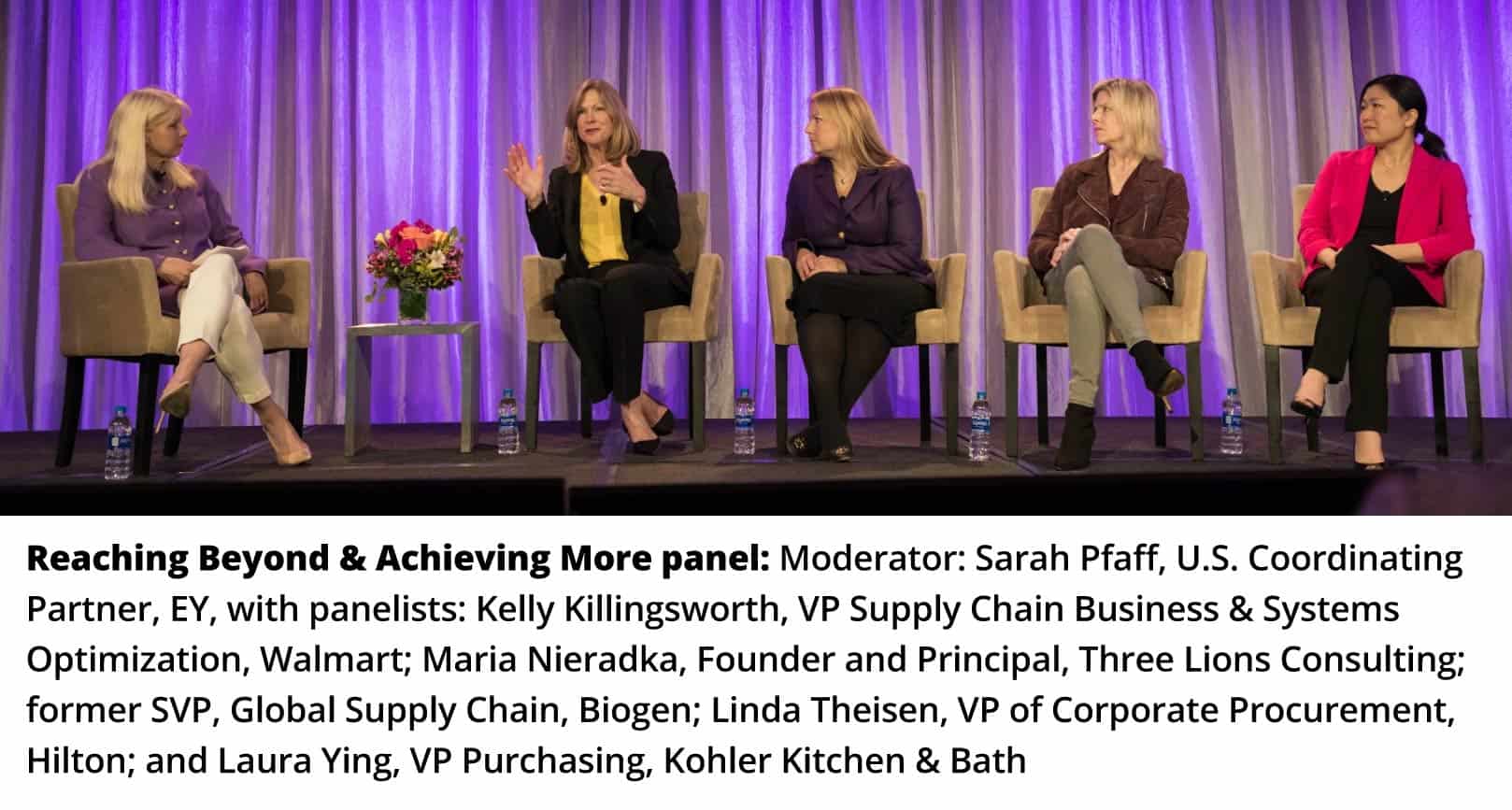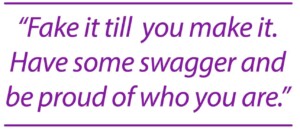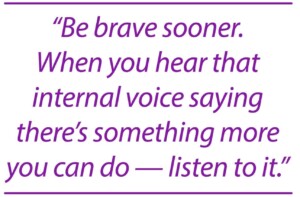
A signature element of AWESOME Symposiums again took place at the 2019 event: a conversation with leading women in the field who shared lessons they’ve learned along the way. The four women on the panel and their moderator have all come to their current supply chain leadership roles by different paths. Although they hadn’t met before, they could easily relate to each others’ stories.
Their challenge for the 2019 AWESOME Symposium was to explore how each of them had “reached beyond” to become successful, focusing on the five dimensions of reaching up, reaching out, reaching in, reaching back and reaching across.
These dimensions also were the focus of interactive “Making Waves” sessions involving all Symposium participants. Their conclusions and their combined recommendations for how leaders can rise in their own career and support the advancement of other women will be published in early fall. The first AWESOME Action Agenda, with insights and recommendations from the 2018 Symposium, is available here.
On the 2019 panel, which was moderated by Sarah Pfaff of EY, Kelly Killingsworth talked about moving through seven different roles in ten years with Walmart. She studied transportation and distribution in college because there wasn’t a supply chain degree at that point. She credits a professor for pointing her in that direction for a career. As she reflected on her career, she realized that at the key turning points, what made the difference was somebody there saying “you can do this” – reaching and pulling her along.
 Maria Nieradka, who recently started her own consulting firm after 30 years rising to ever higher roles in pharmaceutical biotech companies, agrees that having the right mentor or sponsor or advocate to step up and help get to the next level has been key in her career. She believes getting men to be advocates is so critical.
Maria Nieradka, who recently started her own consulting firm after 30 years rising to ever higher roles in pharmaceutical biotech companies, agrees that having the right mentor or sponsor or advocate to step up and help get to the next level has been key in her career. She believes getting men to be advocates is so critical.
 As Linda Theisen has moved through three different industries (automotive, consumer products and now, hospitality), “it’s been thrilling to see that the skills are transferable.” She’s been able to bring some of the more sophisticated capabilities she learned in the other industries to her current role.
As Linda Theisen has moved through three different industries (automotive, consumer products and now, hospitality), “it’s been thrilling to see that the skills are transferable.” She’s been able to bring some of the more sophisticated capabilities she learned in the other industries to her current role.
Laura Ying is not only helping her company, Kohler, move ahead in procurement – she’s the company’s first VP of Purchasing and the first female head of purchasing – she’s also helping the company advance toward greater diversity goals.
She tells the story of the time she had five managers around the world working for her – two Americans, one Chinese, one Italian and all male. When they would go as a group to suppliers, it would always be assumed one of the men was the boss. Then after they’d sit down and talk, she’d see the realization dawn on them, “Oh, the Chinese woman is actually in charge.”
 The panel talked about diversity initiatives their companies are currently undertaking. At one company, eight female directors from director level up to VP meet once a week – reaching out to each other. Another initiative is forcing diverse slates of candidates during recruiting. They also agreed “you can force diversity in but if you don’t have an inclusive environment, it’s like a revolving door.”
The panel talked about diversity initiatives their companies are currently undertaking. At one company, eight female directors from director level up to VP meet once a week – reaching out to each other. Another initiative is forcing diverse slates of candidates during recruiting. They also agreed “you can force diversity in but if you don’t have an inclusive environment, it’s like a revolving door.”
Maria talked about a way she’s found of reaching back and helping others at earlier stages of their career. When she’s figured out what it takes to work effectively with certain executives, she’ll share a “playbook” with others in the organization who also work with that executive. She also put her career on the line for a woman candidate she really believed in, saying “If she doesn’t work out, you can fire me in six months.” (The candidate did work out and actually exceeded expectations, as Maria knew she would.)
 Another way they reached up in their own career is to ask for what they want – whether it’s more flexibility or a new opportunity.
Another way they reached up in their own career is to ask for what they want – whether it’s more flexibility or a new opportunity.
They agreed that building a network – a personal board of advisors — has been a solid source of support, especially when one of them was “re-engineering” herself. Then when you “reach in” and decide to make a bold move or take a risk, you can legitimately ask yourself “What’s the worst that can happen?” because you have a network to fall back on.
And networks that reach outside of normal business contacts have also had benefits in surprising ways, so they recommend staying open to new connections in all areas of your life.
Moderator Sarah Pfaff wrapped up the discussion by asking each panelist to put her best advice into a few words.
- “Stretch yourself.”
“Fake it till you make it. Have some swagger and be proud of who you are.”
“Don’t plan life. Be very open.”
“Be brave sooner. When you hear that internal voice saying there’s something more you can do — listen to it.”
